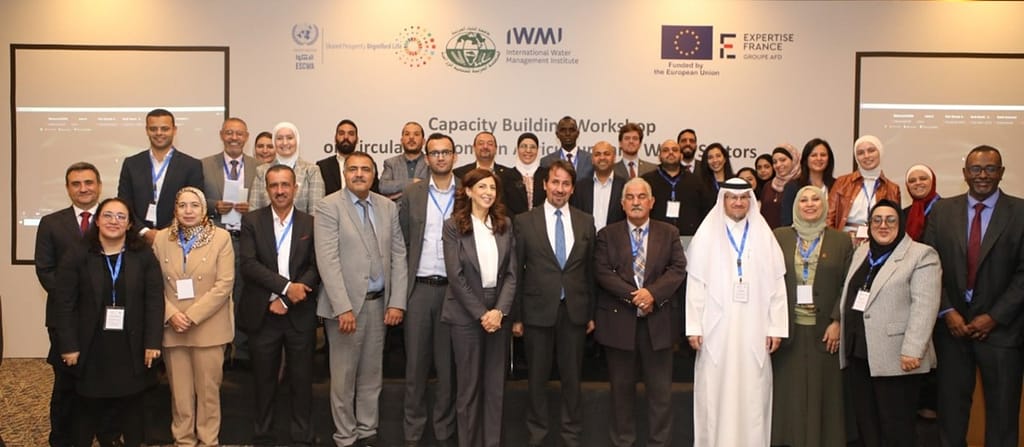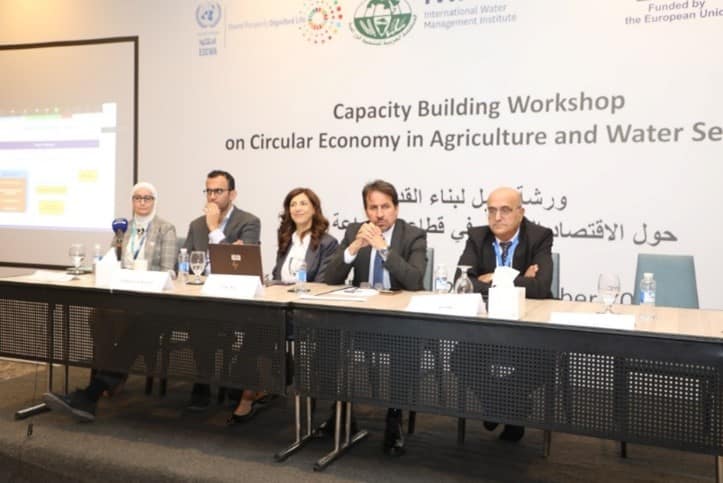By Maha Al-Zu’bi (IWMI), Hammou Laamrani (ESCWA), Nisreen Lahham (AOAD) & Athari AlSadud (Expertise France)

The Arab region faces significant challenges in agriculture and water management, driven by rapid population growth, urbanization, changing consumption habits, and the impacts of climate change. With 90% of the land classified as very arid and 73% of its arable land degraded, the need for sustainable resource management is critical. Water scarcity affects nearly 362 million people across the region, with freshwater resources becoming increasingly scarce and unevenly distributed. This situation is further exacerbated by the region’s heavy reliance on agriculture for food security and economic stability. Addressing these challenges requires innovative and integrated solutions, focusing on efficient water use, sustainable agricultural practices, and the adoption of circular economy principles. Collaborative efforts and regional partnerships are essential to building resilience and ensuring the long-term sustainability of the region’s water and agricultural systems. These efforts will be crucial in mitigating the impact of environmental stressors and ensuring food and water security for future generations.
Partners in progress: Addressing capacity needs for the shift from linear to circular
The International Water Management Institute (IWMI), in collaboration with the United Nations Economic and Social Commission for Western Asia (ESCWA), the Arab Organization for Agricultural Development (AOAD), Expertise France, Jordan’s Ministry of Agriculture and the National Agriculture Research Center hosted a two-day capacity-building workshop on October 28-29, 2024, in Amman, Jordan. The workshop brought together 70 participants from 16 countries, including government officials and experts from various sectors. The event aimed to enhance understanding of circular economy principles and their application in water and agriculture.
Day one focused on water management, introducing circular economy concepts like resource efficiency and waste minimization. Presentations from Jordan, Egypt, Tunisia, and Morocco showcased successful strategies for addressing water scarcity and improving resource use. Participants discussed how these approaches could be applied regionally to improve climate resilience.
Day two shifted to agriculture, exploring how circular economy principles can transform farming practices. Experts shared examples from Egypt, Morocco, and Jordan, highlighting closed-loop systems and regenerative agriculture. These strategies aim to reduce waste, improve soil health, and address environmental impacts of conventional farming.
A key outcome was the creation of a roadmap for implementing circular economy practices in the water and agriculture sectors. The roadmap outlined actionable steps, including policy frameworks, technological innovations, and capacity-building initiatives, to promote long-term sustainability and resilience in the Arab region.

Key success factors for transitioning to a circular economy in water and agriculture
The workshop identified several key success factors for transitioning to a circular economy in the water and agriculture sectors. Early engagement with end users is critical to ensure solutions are practical and widely accepted. Enabling policies, strong institutional frameworks, and clear regulations are essential to support circular practices. Defined responsibilities, accountability mechanisms, and risk mitigation strategies also play key roles. Innovative business models that promote sustainability and resource efficiency, alongside financial viability through diversified funding, are crucial. Together, these factors provide a holistic approach to driving sustainability and resilience in the region’s water and agriculture sectors.
What immediate actions are needed to transition the water and agriculture sectors from a linear to a circular model in the region?
At the regional level, participants recommended the following immediate actions:
- Establish a Comprehensive Regional Circular Economy Agenda: Develop a shared vision for circularity, fostering collaboration among stakeholders and promoting circular business models to create a more sustainable and resource-efficient economy.
- Create a Regional Circular Economy Platform: Set up a platform to facilitate knowledge-sharing, best practices, and coordination among stakeholders in the water and agriculture sectors across the region.
- Enhance Regional Collaboration: Strengthen cooperation between Arab countries and international organizations to share resources and expertise for more effective implementation of circular economy strategies.
At National Levels, participants recommend the following common immediate actions:
- Develop Policies and Regulations: Create policies that support circular economy principles across sectors like water, agriculture, and environmental protection, focusing on resource efficiency, waste reduction, and sustainable water management.
- Invest in Capacity-Building: Organize training programs and workshops to build expertise among policymakers, practitioners, and industry leaders on circular economy practices like water reuse and sustainable agriculture.
- Harmonize Legal Frameworks: Align legal mandates across sectors such as water, agriculture, waste management, and energy to support circular economy practices.
- Foster Innovation through Public-Private Partnerships: Promote investments in technologies like water recycling systems and regenerative farming practices that support circularity in water and agriculture.
- Establish Financing Mechanisms: Create incentives and financial support for circular economy initiatives, including grants, loans, and subsidies for sustainable practices.
- Engage Local Communities: Involve local communities in designing and implementing strategies to ensure solutions are practical and inclusive.
These actions, both at the national and regional levels, will help drive the successful transition from linear to circular models in the water and agriculture sectors, promoting sustainability, resilience, and long-term prosperity for the Arab region.
This work is supported by the CGIAR Initiative on Fragility to Resilience in Central and West Asia and North Africa, and the Expertise France Green Forward Programme- Advancing Policy Frameworks in the Mediterranean funded by EU DG NEAR.








